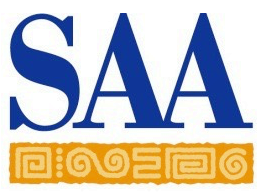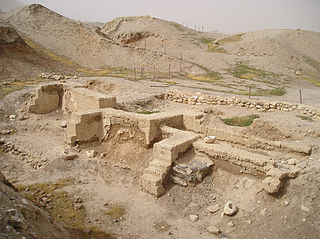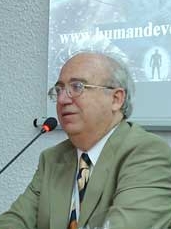Related Research Articles
The historicity of the Bible is the question of the Bible's relationship to history—covering not just the Bible's acceptability as history but also the ability to understand the literary forms of biblical narrative. One can extend biblical historicity to the evaluation of whether or not the Christian New Testament is an accurate record of the historical Jesus and of the Apostolic Age. This tends to vary depending upon the opinion of the scholar.

Sir John Eric Sidney Thompson was a leading English Mesoamerican archaeologist, ethnohistorian, and epigrapher. While working in the United States, he dominated Maya studies and particularly the study of the Maya script until well into the 1960s.
Chris Tilley is a British archaeologist known for his contributions to postprocessualist archaeological theory. He is currently a Professor of Anthropology and Archaeology at University College London.

Glyn Edmund Daniel FBA, FRAI was a Welsh scientist and archaeologist who taught at Cambridge University, where he specialised in the European Neolithic period. He was appointed Disney Professor of Archaeology in 1974 and edited the academic journal Antiquity from 1958 to 1985. In addition to early efforts to popularise archaeological study and antiquity on radio and television, he edited several popular studies of the fields. He also published mysteries under the pseudonym Dilwyn Rees.

The Archaeological Institute of America (AIA) is North America's oldest society and largest organization devoted to the world of archaeology. AIA professionals have carried out archaeological fieldwork around the world and AIA has established research centers and schools in seven countries. As of 2019, the society had more than 6,100 members and more than 100 affiliated local societies in the United States and overseas. AIA members include professional archaeologists and members of the public.
Michael Gordon Fulford, is a British archaeologist and academic, specialising in the British Iron Age, Roman Britain and landscape archaeology. He has been Professor of Archaeology at the University of Reading since 1993.

The Israel Antiquities Authority is an independent Israeli governmental authority responsible for enforcing the 1978 Law of Antiquities. The IAA regulates excavation and conservation, and promotes research. The Director-General is Mr. Eli Escusido, and its offices are housed in the Rockefeller Museum.
David Gibbins is an underwater archaeologist and a bestselling novelist.

The Society for American Archaeology (SAA) is a professional association for the archaeology of the Americas. It was founded in 1934 and its headquarters are in based in Washington, D.C. As of 2019, it has 7,500 members. Its current president is Deborah L. Nichols.
The archaeological record is the body of physical evidence about the past. It is one of the core concepts in archaeology, the academic discipline concerned with documenting and interpreting the archaeological record. Archaeological theory is used to interpret the archaeological record for a better understanding of human cultures. The archaeological record can consist of the earliest ancient findings as well as contemporary artifacts. Human activity has had a large impact on the archaeological record. Destructive human processes, such as agriculture and land development, may damage or destroy potential archaeological sites. Other threats to the archaeological record include natural phenomena and scavenging. Archaeology can be a destructive science for the finite resources of the archaeological record are lost to excavation. Therefore, archaeologists limit the amount of excavation that they do at each site and keep meticulous records of what is found. The archaeological record is the physical record of human prehistory and history, of why ancient civilizations prospered or failed and why those cultures changed and grew. It is the story of the human world.

Local history is the study of history in a geographically local context, often concentrating on a relatively small local community. It incorporates cultural and social aspects of history. Local history is not merely national history writ small but a study of past events in a given geographical area which is based on a wide variety of documentary evidence and placed in a comparative context that is both regional and national. Historic plaques are one form of documentation of significant occurrences in the past and oral histories are another.

Levantine archaeology is the archaeological study of the Levant. It is also known as Syro-Palestinian archaeology or Palestinian archaeology. Besides its importance to the discipline of Biblical archaeology, the Levant is highly important when forming an understanding of the history of the earliest peoples of the Stone Age.

Martin Rundkvist is a Swedish archaeologist and associate professor at the University of Łódź in Poland. His research focuses on the Bronze, Iron, and Middle Ages of Scandinavia, including significant excavations in the province of Östergötland.
Biblical archaeology, occasionally known as Palestinology, is the school of archaeology which concerns itself with the biblical world. In the academic setting it serves as an adjunct to biblical studies, providing the historical, cultural, and linguistic context to scripture.

Michael A. Cremo, also known by his devotional name Drutakarmā dāsa, is an American freelance researcher who describes himself as a Vedic creationist and an "alternative archeologist." He argues that humans have lived on Earth for millions of years. Based on artifacts allegedly found in the Eocene auriferous gravels of Table Mountain, California and discussed in his book Forbidden Archeology, Cremo argues for the existence of modern humans on Earth as early as 30 to 40 million years ago. Forbidden Archeology, which he wrote with Richard L. Thompson, has attracted criticism from mainstream scholars, who describe it as pseudoscientific.

Archaeology or archeology is the study of human activity through the recovery and analysis of material culture. The archaeological record consists of artifacts, architecture, biofacts or ecofacts, sites, and cultural landscapes. Archaeology can be considered both a social science and a branch of the humanities. It is usually considered an independent academic discipline, but may also be classified as part of anthropology, history or geography.

Richard Leslie Thompson, also known as Sadaputa Dasa, was an American mathematician, author and Gaudiya Vaishnava religious figure. Historian Meera Nanda described him as a driving intellectual force of 'Vedic creationism' as co-author of Forbidden Archeology: The Hidden History of the Human Race (1993), a work that has attracted significant criticism from the scientific community. Thompson also published several books and articles on the relationship between religion and science, Hindu cosmology and astronomy. He was a member of the International Society for Krishna Consciousness and a founding member of the Bhaktivedanta Institute, the branch of ISKCON dedicated to examining the relationship of modern scientific theories to the Vaishnava worldview. In the 'science and religion' community he was known for his articulation of ISKCON's view of science. Danish historian of religion Mikael Rothstein described Thompson as "the single dominating writer on science" in ISKCON whom ISKCON has chosen to "cover the field of science more or less on his own". C. Mackenzie Brown, professor of religion at Trinity University, San Antonio, Texas, described him as "the leading figure" in ISKCON's critique of modern science.
This page is a glossary of archaeology, the study of the human past from material remains.
References
Citations
- 1 2 Rothman (1989), p. 35
- ↑ Lindsay, Everett. "NPS Archeology Program: For the Public". National Park Service. Retrieved 15 January 2015.
- ↑ Harris Thompson (2000), p. 230
- ↑ Wade Mead (1974), p. 81
- ↑ Kammen (2011), p. 735
- ↑ Noland, Claire (1 March 2007). "Hal Rothman, 48; writer took academic approach to modern Las Vegas". Los Angeles Times. Archived from the original on 19 February 2015. Retrieved 15 January 2015.
Bibliography
- Harris Thompson, Raymond (2000), "The Antiquities Act of 1906 by Ronald Freeman Lee", Journal of the Southwest, 42 (2): 197–269, JSTOR 40170127
- Kammen, Michael (2011), Mystic Chords of Memory: The Transformation of Tradition in American Culture, Knopf Doubleday Publishing Group, ISBN 978-0-307-76140-8
- Rothman, Hal (1989), Preserving Different Pasts: The American National Monuments, University of Illinois Press, ISBN 978-0-252-01548-9
- Wade Mead, C. (1974), Road to Babylon: Development of U.S. Assyriology, Brill Archive, ISBN 90-04-03858-2